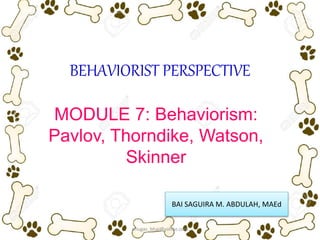
Module 7 behaviorist perspective
- 1. BEHAVIORIST PERSPECTIVE MODULE 7: Behaviorism: Pavlov, Thorndike, Watson, Skinner BAI SAGUIRA M. ABDULAH, MAEd ariugas_bhai@yahoo.com
- 2. Behaviorism Classical Conditioning (Pavlov/Watson) Connectionism (Thorndike) Primary Laws Law of Effect Law of Exercise Law of Readiness Operant Conditioning (Skinner) Reinforcement Shaping of Behavior ariugas_bhai@yahoo.com
- 3. • Ivan Pavlov A Russian psychologist, I well know for his work in classical conditioning or stimulus substitution. Experiment involved meat, a dog and a bell. ariugas_bhai@yahoo.com
- 5. • Stimulus Generalization – once the dog has learned to salivate at the sound of the bell, it will salivate at other similar sounds. • Extinction – if you stop pairing the bell with the food, salivation eventually cease in response to the bell • Spontaneous recovery – extinguished responses can be “recovered” after an elapse time but it will soon extinguished again if the dog is not presented with food. ariugas_bhai@yahoo.com
- 6. • Discrimination – the dog could learn to discriminate between similar bells (stimuli) and discern which bell would result in the presentation of food and which would not. • Higher –Order Conditioning – once the dog has been conditioned to associate the bell with food, another unconditioned stimulus, such as a light may be flashed at the same time that the bell is rung. ariugas_bhai@yahoo.com
- 7. • Edward L. Thorndike Connectionism theory gave us the original S-R framework of behavioral psychology. The main principle of connectionism was that learning could be adequately explained without considering any observable internal states. “ ariugas_bhai@yahoo.com
- 8. • Learning has taken place when a strong connectionism or bond between stimulus and response is formed” ariugas_bhai@yahoo.com
- 9. • Law of Effect - connection between a stimulus and response is strengthened when the consequences is positive (reward) and the connection between the stimulus and the response is weakened when the consequence is negative. • Law of Exercise – the more S-R (stimulus response) bond is practice the stronger it will become. ariugas_bhai@yahoo.com
- 10. • Law of Readiness – the more readiness the learner has to respond to the stimulus, the stronger will be the bond between them. ariugas_bhai@yahoo.com
- 11. Principles Derived from Thorndike’s Connectionism 1. Learning requires both practice and rewards (laws of effect/exercise) 2. A series of S-R connectionism can be chained together if they belong to the same action sequence (law of readiness) 3. Transfer of learning occurs because of previously encountered situations. 4. Intelligence is a function of the number of connections learned. ariugas_bhai@yahoo.com
- 12. • John Watson First American psychologist to work with Pavlov’s ideas. He considered that humans are born with a few reflexes and the emotional reactions of love and rage. All other behavior is learned through stimulus-response associations through conditioning. ariugas_bhai@yahoo.com
- 13. Experiment on Albert • His work did clearly show the role of conditioning in the development of emotional responses to certain stimuli. This may help us understand the fears, phobias and prejudices that people develop. ariugas_bhai@yahoo.com
- 14. • Burrhus Frederick Skinner • Believed in the S-R pattern of conditioned behavior. • Wrote Walden Two (1948) and Science and Human Behavior (1953) • Studied operant behavior (voluntary behaviors used in operating on the environment ariugas_bhai@yahoo.com
- 15. Operant Conditioning • Based upon the notion that learning is a result of change in overt behavior. Change in behavior are the result of individual’s response to event (stimuli) that occur in the environment. • Reinforcement - is the key element in Skinner’s S-R theory. • Reinforcer – anything that strengthen the desired responses. ariugas_bhai@yahoo.com
- 16. • Positive reinforcer – any stimulus that is given or added to increase the response. • Negative reinforcer - any stimulus that results in the increased frequency of a response when it is withdrawn or removed . A negative reinforcer is not a punishment, it is a reward. • Punishment - consequence intended to result in a reduced responses. ariugas_bhai@yahoo.com
- 17. • Extinction or Non-reinforcement: responses that are not reinforced are not likely to be repeated. • Shaping behavior - successive approximation of the behavior are rewarded. • Behavior chaining - comes about when a series of steps are needed to be learned. • Reinforcement schedules – once the desired behavioral response is accomplished, reinforcement does not have to be 100% ariugas_bhai@yahoo.com
- 18. • Fixed interval schedule - target response is reinforced after a fixed amount of time has passed since the last reinforcement. • Variable inter schedule – similar to fixed interval schedule but the amount of time that must pass between reinforcement varies. • Fixed ratio schedule - fixed number of correct responses must occur before reinforcement may recur. • Variable ratio schedule – number of correct repetitio9ns of the correct response for reinforcement varies ariugas_bhai@yahoo.com
- 19. Implication of Operant Conditioning 1. Practice should take the form of question (stimulus) - answer (response) frames which expose the student to the subject in gradual steps. 2. Require that the learner makes a response for every frame and received immediate feedback 3. Try to arrange the difficulty of the questions so the response is always correct and hence, a positive reinforcement. 4. Ensure that good performance in the lesson is paired with secondary reinforcers such as verbal praise, prizes and good grades. ariugas_bhai@yahoo.com
- 20. Principles derived from Skinner’s Operant Conditioning 1. Behavior that is positively reinforced will reoccur; intermittent reinforcement is particularly effective. 2. Information should be presented in small amounts so that responses can be reinforced (shaping). 3. Reinforcements will generalized across similar stimuli (stimulus generalization) producing secondary conditioning. ariugas_bhai@yahoo.com